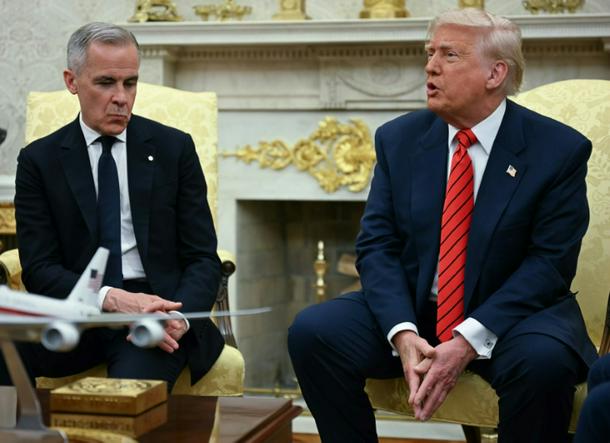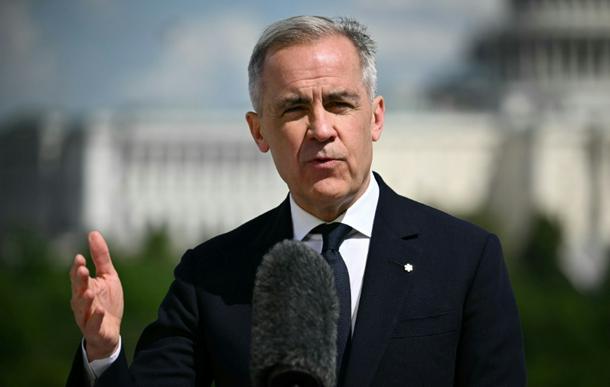
US President Donald Trump meets with Canadian Prime Minister Mark Carney in the Oval Office of the White House in Washington, DC, on May 6, 2025.
Washington (AFP) - Canadian Prime Minister Mark Carney told US President Donald Trump on Tuesday that his country would be “never for sale” as they met at the White House amid tensions on tariffs and sovereignty.
In their first Oval Office meeting, Trump insisted to the recently elected Carney that it would be a “wonderful marriage” if Canada agreed to his repeated calls to become the 51st US state.
But afterward both leaders hailed the talks as having made progress – even if Carney said he had asked Trump in private to stop calling for Canada to join the United States.
“As you know from real estate, there are some places that are never for sale,” Carney told property tycoon Trump, comparing Canada to the Oval Office itself and to Britain’s Buckingham Palace.
“Having met with the owners of Canada over the course of the campaign in the last several months, it’s not for sale. It won’t be for sale, ever.”
Trump then replied: “Never say never.”
Liberal leader Carney, 60, won Canada’s April 28 election on a pledge to stand up to Republican Trump, 78, warning that ties between the North American neighbors could never be the same.
Trump has sparked a major trade war with Canada with his tariffs while repeatedly making extraordinary calls for the key NATO ally and major trading partner to become part of the United States.
- ‘Very constructive’ -
Carney at points gripped his hands tightly together and his knee jiggled up and down while Trump spoke.

Canadian Prime Minister Mark Carney speaks to the media after a meeting with US President Donald Trump at the Embassy of Canada to the United States in Washington, DC, on May 6, 2025.
Trump, when asked if there was anything Carney could say in the meeting that would persuade him to drop tariffs, replied bluntly: “No. It’s just the way it is.”
The US president even referenced his blazing Oval Office row with Ukraine’s Volodymyr Zelensky in February – if only to insist that there would be no repeat.
“We had another little blow-up with somebody else, that was much different – this is a very friendly conversation,” Trump said.
Yet after the two-hour meeting both leaders struck a positive tone.
Carney told a press conference that the trade talks were “complex” but that his two-hour discussions with Trump were “very constructive.”
“He’s willing to have that negotiation,” Carney said when asked if Trump would be ready to drop tariffs as part of a deal.
But he added that he had called on Trump to stop urging Canada to become its 51st state.
“I told him that it wasn’t useful to repeat this idea, but the president will say what he wants,” said Carney, speaking in French.
For his part, Trump said there was “no tension” during the “very great” meeting with Carney.
“We want to do what’s right for our respective peoples,” he said at an event on the 2026 World Cup, which the United States will co-host with Canada and Mexico.
- ‘Cherished’ -
The meeting was highly anticipated after a Canadian election during which Carney vowed that the United States – Canada’s biggest trading partner – would never “own us.”

US President Donald Trump greets Canadian Prime Minister Mark Carney as he arrives at the White House in Washington, DC, on May 6, 2025.
Carney has since vowed to remake NATO member Canada’s ties with the United States in perhaps its biggest political and economic shift since World War II.
Trump has slapped general tariffs of 25 percent on Canada and Mexico and sector-specific levies on autos, some of which have been suspended pending negotiations. He has imposed similar duties on steel and aluminum.
He has also more broadly accused Canada of “ripping off” the United States and treating it unfairly on trade, while also calling on both Canada and Mexico to stop the cross-border flow of the deadly drug fentanyl.
The US president inserted himself into Canada’s election early on by calling on Canada to avoid tariffs by becoming the “cherished 51st state.”
Pierre Poilievre’s Conservative Party had been on track to win the vote but Trump’s attacks, combined with the departure of unpopular premier Justin Trudeau, transformed the race.
Carney, who replaced Trudeau as prime minister in March, convinced voters that his experience managing economic crises made him the ideal candidate to defy Trump.
The political newcomer previously served as governor of the Bank of Canada and the Bank of England.